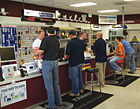
In its 149 years of business, Lyon Conklin & Co. understands the importance of changing with the times, especially when it comes to refrigerant transitions.
Extended warranties, equipment costs, and the R-22 phaseout all present distributors with puzzles to solve in 2009 and the coming years. Each region and distributor faces these challenges uniquely, but the standard goals are survival and growth.
Lyon Conklin & Co. and Munch’s Supply Co. both know what it means to survive and grow during industry changes. Together, the two companies have been in existence for 202 years and finding a problem they haven’t addressed could prove difficult.
AGE HAS EXPERIENCE
Lyon Conklin & Co. has been in business for 149 years. Begun in 1860, the distributor employs more than 250 employees across 23 locations covering Maryland, Virginia, West Virginia, Delaware, southern New Jersey, eastern Pennsylvania, eastern Kentucky, and the District of Columbia. Primarily operating in the HVAC residential and light commercial, sheet metal, parts, and supplies categories, the company is a Trane and American Standard Heating and Air Conditioning distributor.Working diligently to train and transition its dealers to R-410A systems, Lyon Conklin reports that approximately 90 percent of its equipment sales are R-410A. The distributor is seeing that the refrigerant is trending towards mainstream usage and this has helped them streamline product offerings and better serve their customers.
“Most dealers and builders have accepted the R-410A change and are no longer promoting R-22 systems,” said David Brown, general manager for Lyon Conklin & Co.
Warranties are something that this experienced distributor is examining as well. More and more, manufacturers are beginning to offer longer original equipment warranties. In the short term, Brown thinks this trend will provide more value and security for homeowners and will help distributors sell more equipment.
“Long term, I think it will have a negative impact on distributor parts revenue, dealer service revenue, and cause homeowners to replace parts instead of systems,” explained Brown.
Another reason for increased parts replacements in the current market is increased equipment cost. With these two factors playing into the near and long term strategies, Lyon Conklin intends to increase its parts inventory based on increased demand.
“We will be required to carry a broader selection of units and new products offered by the manufacturer,” said Brown. “As such, we are continuously adapting our product offerings to meet the needs of our customers - regardless.”
FIFTY IS THE NEW SAGE
Existing 149 years is impressive, but being in business for 53 years gives a company some solid wisdom and credentials as well. Munch’s Supply Co., an American Standard Heating & Air Conditioning distributor based in New Lenox, Ill., serves the Chicago and northwest Indiana markets. This HVAC and hydronic wholesaler distributor employees 125 people committed to supporting its customers throughout the evolution of the industry, including the refrigerant phaseout and extended warranties.Robert Munch, president of Munch’s Supply, addressed the approaching refrigerant phaseout, suggesting that there were significant advantages to distributors choosing to expedite the phaseout of R-22 products.
“From an inventory standpoint, it is a logistical nightmare because you absolutely don’t want to carry R-22 inventory over into the next year when it will truly be obsolete,” he explained. “We expect the R-22 product to be virtually unsellable next year, and a quick phaseout will allow distributors to reduce SKUs on both condensers and coils by almost 50 percent.”
On the heels of the refrigerant phaseout are longer manufacturer warranties. Munch’s take on the matter differs from Brown’s. According to Munch, these extended warranties are a necessity in order for the manufacturers to remain competitive in the market.
“Failure to do so will put the product at a competitive disadvantage,” he said. “Ultimately the longer warranty will come at a price, eventually to be passed on to the consumer. We will miss some profit from parts sales in the future, but we don’t see any substantial long term negative effects.”
As for parts and the repair versus replace discussion, Munch assumes that distributors will naturally move to the areas of business that produce profit and sales.
“As sales of parts increase, I imagine distributors will put efforts to grow this business through increased inventory, expanded product offerings, and focused marketing efforts.”
GROWING UP
Both companies are looking to manage the downturn and move beyond survival and adaptation into growth. “While we are managing the downturn in the industry like everyone else, we are also seeing the potential opportunities that exist in the marketplace,” explained Munch. “Opportunities for expansion and acquisition exist and we are looking at all our options.”Brown, along with a host of other distributors, couldn’t agree more.
Publication date:07/20/2009


Report Abusive Comment